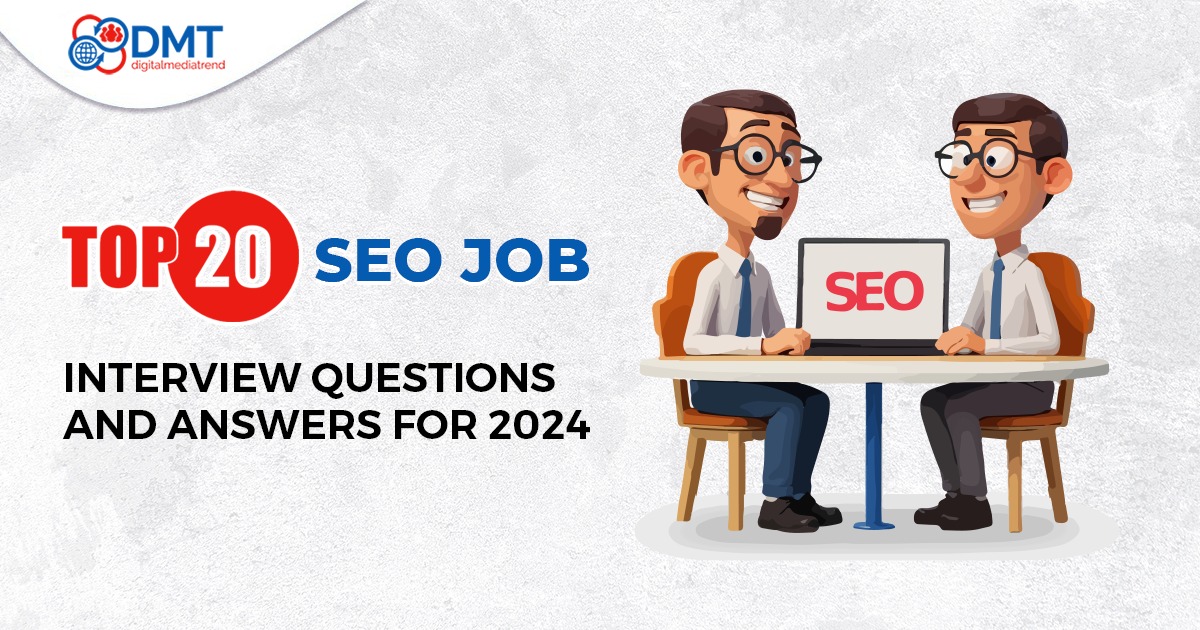Here are the Top 20 SEO Job Interview Questions and Answers For 2024
General SEO Knowledge
What is SEO and why is it important?
Answer: SEO (Search Engine Optimization) is the practice of optimizing websites to increase their visibility and ranking on search engine results pages (SERPs). It is important because higher visibility leads to more traffic, which can translate to more conversions and revenue.

What are the main components of SEO?
Answer: The main components of SEO include on-page SEO (content, keywords, meta tags), off-page SEO (backlinks, social signals), technical SEO (site speed, mobile-friendliness, crawlability), and user experience (UI/UX).
What is the difference between on-page and off-page SEO?
Answer: On-page SEO refers to optimizations made directly on the website, such as content quality and HTML tags. Off-page SEO refers to actions taken outside the website to impact its SERP ranking, like link building and social media marketing.
What is a backlink? Why are backlinks important?
Answer: A backlink is a link from one website to another. Backlinks are important because they act as votes of confidence for the linked content, helping to improve the linked website’s authority and ranking on search engines.
Explain the concept of keyword research and its significance.
Answer: Keyword research involves identifying popular words and phrases that people enter into search engines. Its significance lies in understanding the search intent and optimizing content to rank for those keywords, driving targeted traffic to the site.
Technical SEO
What is a sitemap and why is it important?
Answer: A sitemap is a file where you provide information about the pages, videos, and other files on your site, and the relationships between them. Search engines like Google read this file to crawl your site more intelligently.
What is robots.txt?
Answer: Robots.txt is a file used to instruct web robots (usually search engine bots) about which pages on your site should not be crawled. This helps in managing crawler traffic and preventing the indexing of certain pages.
How do you make a website mobile-friendly?
Answer: To make a website mobile-friendly, you should use responsive design, ensure fast loading times, use legible fonts, and make navigation easy. Google’s Mobile-Friendly Test tool can help check a site’s mobile-friendliness.
What is page speed and why does it matter?
Answer: Page speed is the time it takes for a webpage to load. It matters because faster-loading pages provide a better user experience and are favored by search engines, which can improve rankings.
Explain the importance of HTTPS.
Answer: HTTPS (Hypertext Transfer Protocol Secure) encrypts data exchanged between the user’s browser and the website, ensuring data integrity and security. It is important for SEO because Google uses HTTPS as a ranking signal.
Tools and Analytics
Which SEO tools do you use and why?
Answer: Common SEO tools include Google Analytics (for tracking website traffic and user behavior), Google Search Console (for monitoring site performance in Google search), Ahrefs and SEMrush (for keyword research and backlink analysis), and Yoast SEO (for on-page SEO optimization).
How do you measure the success of an SEO campaign?
Answer: The success of an SEO campaign can be measured using various metrics such as organic traffic, keyword rankings, conversion rate, bounce rate, and the number and quality of backlinks.
What is Google Search Console and how do you use it?
Answer: Google Search Console is a free tool that helps you monitor, maintain, and troubleshoot your site’s presence in Google Search results. It can be used to submit sitemaps, check indexing status, view search analytics, and identify crawling issues.
How do you perform a keyword analysis?
Answer: Keyword analysis involves using tools like Google Keyword Planner, Ahrefs, or SEMrush to find relevant keywords, analyzing their search volume, competition, and relevance to your content, and then selecting the best keywords to target.
What is the role of analytics in SEO?
Answer: Analytics in SEO helps track and analyze the performance of SEO efforts, understand user behavior, measure the effectiveness of strategies, and make data-driven decisions to improve SEO tactics.
Advanced Topics
What are Core Web Vitals?
Answer: Core Web Vitals are a set of metrics introduced by Google that measure the loading performance, interactivity, and visual stability of a webpage. They include Largest Contentful Paint (LCP), First Input Delay (FID), and Cumulative Layout Shift (CLS).
How do you handle duplicate content issues?
Answer: Duplicate content issues can be handled by using canonical tags to indicate the preferred version of a page, using 301 redirects, setting up proper URL parameters, and ensuring that content is unique and original.
What is E-A-T and why is it important for SEO?
Answer: E-A-T stands for Expertise, Authoritativeness, and Trustworthiness. It is important for SEO because Google uses these criteria to evaluate the quality and credibility of content, especially for YMYL (Your Money or Your Life) topics.
How do you optimize content for voice search?
Answer: To optimize content for voice search, focus on natural language and conversational queries, use long-tail keywords, optimize for local search, and ensure your content answers questions directly and succinctly.
Explain the concept of local SEO and its importance.
Answer: Local SEO is the practice of optimizing a website to attract traffic from local searches. It is important for businesses that serve specific geographic areas because it helps them be found by potential customers in their locality. Key tactics include optimizing Google My Business profiles, building local citations, and getting reviews.

